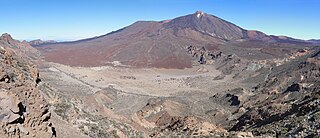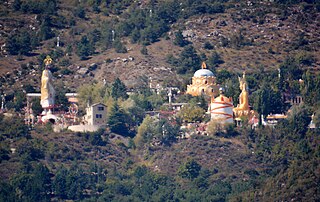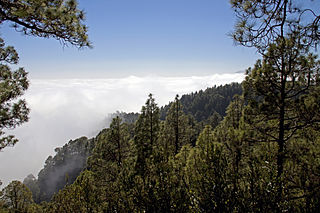
The Order of the Solar Temple, or simply the Solar Temple, was a new religious movement and secret society, often described as a cult, notorious for the mass deaths of many of its members in several mass murders and suicides throughout the 1990s. The OTS was a neo-Templar order, claiming to be a continuation of the Knights Templar, and incorporated an eclectic range of beliefs with aspects of Rosicrucianism, Theosophy, and New Age ideas. It was led by Joseph Di Mambro, with Luc Jouret as a spokesman and second in command. It was founded in 1984, in Geneva, Switzerland.

Teide, or Mount Teide, is a volcano on Tenerife in the Canary Islands, Spain. Its summit is the highest point in Spain and the highest point above sea level in the islands of the Atlantic. If measured from the ocean floor, its height of 7,500 m (24,600 ft) makes Teide the third-highest volcano in the world, UNESCO and NASA rank it as Earth's third-tallest volcanic structure. Teide's elevation above sea level makes Tenerife the tenth highest island in the world.
The Center for Studies on New Religions, otherwise abbreviated as CESNUR, is a nonprofit organization based in Turin, Italy that focuses on the academic study of new religious movements and opposes the anti-cult movement. It was established in 1988 by Massimo Introvigne, Jean-François Mayer, and Ernesto Zucchini.
Cult is defined by the Oxford English Dictionary as "A relatively small group of people having beliefs or practices regarded by others as strange or sinister, or as exercising excessive control over members." The term is often applied to new religious movements and other social groups which have unusual, and often extreme, religious, spiritual, or philosophical beliefs and rituals. Extreme devotion to a particular person, object, or goal is another characteristic often ascribed to cults. The term has different, and often divergent or pejorative, definitions both in popular culture and academia, and has been an ongoing source of contention among scholars across several fields of study.

Massimo Introvigne is an Italian sociologist of religion, author, and intellectual property attorney. He is a co-founder and the managing director of the Center for Studies on New Religions (CESNUR), a Turin-based nonprofit organization which has been described as "the highest profile lobbying and information group for controversial religions".

Teide Observatory, IAU code 954, is an astronomical observatory on Mount Teide at 2,390 metres (7,840 ft), located on Tenerife, Spain. It has been operated by the Instituto de Astrofísica de Canarias since its inauguration in 1964. It became one of the first major international observatories, attracting telescopes from different countries around the world because of the good astronomical seeing conditions. Later, the emphasis for optical telescopes shifted more towards Roque de los Muchachos Observatory on La Palma.
The Brahma Kumaris is a spiritual movement that originated in Hyderabad, Sindh, Pakistan during the 1930s. Founded by Lekhraj Kripalani, the organisation teaches the importance of moving beyond labels associated with the human body, including race, nationality, religion, and gender, through meditation that emphasizes the concept of identity as souls rather than bodies. It aims to establish a global culture centered around what they refer to as "soul-consciousness". The members of the organisation believe that all souls are good by nature and that God is the source of all goodness.

Michel Tabachnik is a Swiss conductor and composer with an international career. A promoter of contemporary music, he has premiered a dozen works by Iannis Xenakis, among others. He is also the author of essays on music and novels.

Teide National Park is a national park located in Tenerife, Canary Islands, Spain.

The Vacuum Tower Telescope is an evacuated-optics solar telescope located at the Teide Observatory on Tenerife in the Canary Islands. It is operated by the Kiepenheuer-Institut für Sonnenphysik (KIS).

Tourism is an essential part of the economy of the Canary Islands, a Spanish archipelago located in the Atlantic Ocean, 100 kilometres west of Morocco. Seven main islands and six islets make up the Canary Islands. They had 16 million visitors in 2023. Tourists seeking sunshine and beaches first began to visit the Canaries in large numbers in the 1960s. The Canary Islands are a leading European tourist destination with very attractive natural and cultural resources.

Aumism is a minor religious sect founded in 1969 by Gilbert Bourdin (1923–1998). Centered on the "holy city" of Mandarom, near Castellane in the French Alps, it has approximately 400 members, down from 1200 at its peak. It is a synthesis of a number of religions, most prominently Hinduism. Its name derives from the mystical "aum" sound used in Hindu meditation, which is said to be the sound that gave birth to all other sounds. There is debate about whether Bourdin's founding of the Ashram of Mandarom in 1969 marked the beginning of the Aumist movement.
Jean-François Mayer is a Swiss religious historian, author, and translator. He is also Director of the Religioscope Institute, which he founded. He received his masters degree, and then his doctorate, from the Jean Moulin University Lyon 3 in 1979 and 1984. His writing focuses on religion, with a particular focus on new religious movements and cults, including the Unification Church, the Church of Scientology and the Pilgrims of Arès.
As in the rest of Spain, the majority religion in the Canary Islands is the Catholic Church. The Catholic religion has been the majority since the Conquest of the Canary Islands in the fifteenth century. This religion would largely replace the Canarian aboriginal religion through the prohibition of the latter and syncretism. According to a survey conducted in 2019, Canary Islands is the fifth autonomous community in Spain with the highest percentage of people who declare themselves to be Catholics after the Region of Murcia, Extremadura, Galicia, Aragon, and Castile and León. 76.7% of the population is Catholic.

The Canary Islands dry woodlands and forests is a Mediterranean forests, woodlands, and scrub ecoregion in the Canary Islands. It encompasses the western group of the Canary Islands – La Palma, El Hierro, La Gomera, Tenerife, and Gran Canaria – in the Atlantic Ocean. These volcanic islands are an autonomous community of Spain, and lie southwest of the Spanish mainland and west of the North African coast.

Julien Origas was a French Rosicrucian. In his 20s, he was sentenced to prison by the French government for collaborating with the Nazi occupation, for which he received several years in prison, though he was amnestied after serving two. Following his release from prison, he became interested in esotericism, and joined AMORC, a large Rosicrucian organization.

Following the Order of the Solar Temple affair – a case that gained international notoriety when members of the group, a then-obscure neo-Templar group, orchestrated several mass suicides and mass murders in the 1990s – there have been several books and studies published about the events and organization. The case became a media sensation, with many conspiracy theories promoted by the media. As described by Susan J. Palmer, "false or unverifiable trails have been laid: secondhand testimonies are traded by journalists, ghost-written apostate memoirs are in progress and conspiracy theories abound."
On 22 March 1997, five members of the Order of the Solar Temple (OTS) committed mass suicide in Saint-Casimir, Quebec, setting their house on fire with them inside. Among the dead were two couples: Didier and Chantal Quèze and Bruno Klaus and Pauline Riou, as well as Chantal's mother Suzanne Druau. The three children of the Quèzes had initially been included in the suicide plan, but the first attempt to initiate the suicide failed. After the failure of the first attempt, they confronted their parents, and convinced them that they wanted to live and were let go. Following two more unsuccessful attempts to orchestrate the suicide, the final attempt, with help from the children, was successful.
Néo-Phare was a small French new religious movement, often described as a cult or doomsday cult, founded by Arnaud Mussy in January 2001. It formed through a schism with Phare-Ouest, which was founded by the esoteric writer André Bouguenec. Bouguenec's belief system incorporated Kabbalah and hermeticism, and he also proclaimed that he was God. Mussy joined the group in 1997, and Bouguenec died the same year. Viewing the original group as too rigid, Mussy and 20 members left the group and formed Néo-Phare.

The Sovereign Order of the Solar Temple, abbreviated as OSTS, was a neo-Templar revivalist order and secret society. It claimed to be a direct continuation of the Knights Templar. It was founded by French esotericist Jacques Breyer and Maxime de Roquemaure in 1952, and was formally established in 1966 in Monaco. Its Grand Master was Jean-Louis Marsan. The order was dissolved in 1994.











